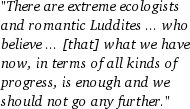Democratic Transhumanism
James Hughes, Ph.D.
page 3 of 8
The Biopolitical Spectrum
On one end of the biopolitical spectrum, the bioconservatives make up an incredibly diverse coalition of people, one that is increasingly self-conscious of its own common interests. On the other end, you have its backbone and anchor, the religious right.  The religious right's objection to these kinds of technologies can be taken back to their opposition to autopsies five hundred years ago. More recently, they source C.S. Lewis’ book “The Abolition of Man”, which makes Christian arguments against human genetic engineering. Then there are extreme ecologists and romantic Luddites and various others who believe, as Bill McKibben argues in his book, "Enough: Staying Human in an Engineered Age"[1], that we should say, "Enough! What we have right now, in terms of all kinds of progress, is enough and we should not go any further."
The religious right's objection to these kinds of technologies can be taken back to their opposition to autopsies five hundred years ago. More recently, they source C.S. Lewis’ book “The Abolition of Man”, which makes Christian arguments against human genetic engineering. Then there are extreme ecologists and romantic Luddites and various others who believe, as Bill McKibben argues in his book, "Enough: Staying Human in an Engineered Age"[1], that we should say, "Enough! What we have right now, in terms of all kinds of progress, is enough and we should not go any further."
We also have leftist and feminist critics of biotech who think, because of concerns for equity of access and corporate control and the ways that the Nazis and fascists and other kinds of people have used these technologies, that we need to ban these technologies. Finally, we have the "pro-disability extremists" who are disability rights activists that believe they not only have to fight for the rights of those with disabilities, but must defend disability as an equal way of life by resisting anything that might overcome it. This is quite an extreme position, but one that is increasingly present within the disability rights movement.
2002, A Landmark Year
When we look back on the emergence of biopolitics, we will recognize 2002 as a landmark year. In 2002, Leon Kass was appointed to the President's Council on Bioethics; Fukuyama published “Our Posthuman Future”; Greg Stock published “Redesigning Humans”; the Christian Right published their “Manifesto on Biotechnology and Human Dignity”; the Vatican published the Ratzinger-supervised document, “Human Persons Created in the Image of God”, which argues the Vatican's emerging position on human enhancement; and McKibben published “Enough” in 2003.
In addition, the President’s Council on Bioethics (PCB) published, “Beyond Therapy”, which is their attack on human enhancement technology. The people who like that report claim it is a nuanced, poetic, academic treatise. In reality, it is a subtle attack on human enhancement technology. In the report, none of the beneficial arguments about why it is good to live an extra fifty years are taken seriously.
Emerging Critics of Biotech
Recently, the Women's Bioethics Project (WPB)[2] added up all the money the Christian Right has poured into attacks on bioethics since 2002 (on human enhancement in particular, but also on abortion and stem cells) and it added up to tens of millions of dollars.
The Center for Bioethics and Culture in California is a proliferating, metastasizing network of Christian bioethics institutions underwritten by the following institutions: Chuck Colson's Prison Ministries; the Trinity International University and their Center for Bioethics and Human Dignity, which has a list of hundreds of Christian Right bioethics speakers who can attack anything you want them to attack; the Discovery Institute, which is better known for advocating intelligent design, but is also the base for Wesley J. Smith, who argues that America is turning into a "culture of death"; the Ethics and Public Policy Center in Washington D.C., home of the New Atlantis journal[3] and Eric Cohen, who works closely with the President's Council; the American Enterprise Institute, where Kass, Fukuyama, and PCB member James Wilson are are ensconced; the National Catholic Bioethics Center; and even the Hudson Institute, where Michael Fumento, who is positive on some biotech, yet opposed to other technologies like stem cell research, works closely with the Christian right.
Footnotes
1. "In this wise, well-researched, and important book ("Enough: Staying Human in an Engineered Age"), Bill McKibben addresses the burning philosophical question of the new century, and the one that counts for the long haul: how to control the technoscientific juggernaut before it dehumanizes our species." --E. O. Wilson, author of The Future of Life http://www.henryholt.com/holt/enough.htm March 23, 2006 12:47PM EST (back to top)
2. The Women’s Bioethics Project is the leading nonprofit, nonpartisan public policy think tank dedicated to ensuring that women’s voices, health concerns, and unique life experiences strongly influence ethical issues in health care and biotechnology. Through education, reports, legislative testimony, articles, public conferences and debates, media coverage, and a publicly accessible website we serve as a bridge between scholarship and policymaking; bringing new knowledge to the attention of decision makers and affording scholars, scientists and corporate leaders greater insight into public policy issues. http://www.womensbioethics.org/ March 23, 2006 12:58PM EST (back to top)
3. The New Atlantis is an effort to clarify the nation’s moral and political understanding of all areas of technology—from stem cells to hydrogen cells to weapons of mass destruction. We hope to make sense of the larger questions surrounding technology and human nature, and the practical questions of governing and regulating science—especially where the moral stakes are high and the political divides are deep. http://www.thenewatlantis.com/about/ March 23, 2006 1:02PM EST (back to top)